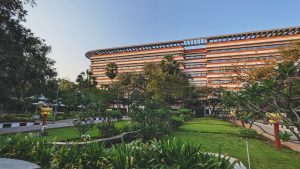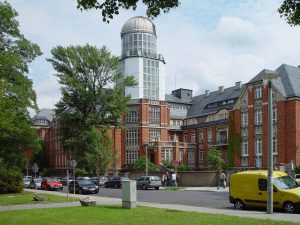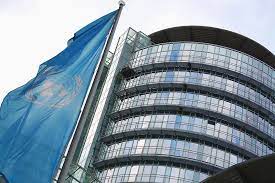
RWTH Aachen University – or Rheinisch-Westfälische Technische Hochschule Aachen – is a place where the future of our industrialized world is thought about. The university proves itself as an internationally recognized hotspot, where innovative answers to global challenges are developed.
With 260 institutes, RWTH Aachen University is one of Europe’s premier educational and research institutions. The University’s nine faculties offer a wide range of academic subjects, including most traditional academic disciplines. Around 540 professors and about 8,000 staff are working in research, teaching, and administration. RWTH Aachen University is among the leading European scientific and research institutions and has set itself clearly defined goals in terms of academic output, quality of its graduates and external funding.
RWTH Aachen University offers competence-, research- and practice-oriented training with the goal of developing highly qualified and responsible graduates for leading positions in science, society and business. The academic education at our university is application oriented. As a result, our graduates are sought after as talented researchers and leaders. The University educates over 47,000 students enrolled in 150 courses. This includes more than 12,477 international students from over 138 countries.
At the IWW many aspects of hydraulic engineering and water management are investigated in national and international research projects. The research activities include basic research as well as applied and practical questions. The research activities of the IWW are divided into the following three research groups: (1) Coasts and Flood, (2) Morphodynamics and Sediments and (3) Energy and environment.

Professor
Head of the institute
Institute of Hydraulic Engineering and Water Resources Management
RWTH Aachen University
Mies-van-der-Rohe-Str. 17
52074 Aachen
Germany
schuettrumpf@iww.rwth-aachen.de
http://www.rwth-aachen.de/Prof. Dr.-Ing., Holger Schüttrumpf

The Asian Institute of Technology (AIT) is an international English-speaking postgraduate institution, focusing on engineering, environment, and management studies. AIT’s rigorous academic, research, and experiential outreach programs prepare graduates for professional success and leadership roles in Asia and beyond. Founded in 1959, AIT offers the opportunity to study at an institution in Asia which possesses a global reputation. Going forward, AIT will be stressing its global connections, injection of innovation into research and teaching, its relevance to industry, and its nurturing of entrepreneurship, while continuing to fulfill its social impact and capacity building role. Sitting on a beautiful green campus located just north of Bangkok, Thailand, AIT operates as a multicultural community where a cosmopolitan approach to living, and learning is the rule.
AIT offers Masters Degrees (MBA, Meng, MSc), Executive Master Degree, Doctoral Degrees (DEng, DTescSc, PhD, DBA), Certificate Programs, and Non-degree continuing education courses for practicing professionals. Today, AIT’s internationally recognized engineering, environment, and management graduates are highly sought after by employers in their home country and elsewhere. Across many walks of life in Asia, AIT alumni have distinguished themselves as CEO’s of private and state enterprises, as business owners, as well-respected researchers and faculty, and as senior university and government officials. Please click here for further information about AIT.
The Water Engineering and Management (WEM) program of the Asian Institute of Technology (AIT), under the Department of Civil and Infrastructure Engineering (CIE) in the School of Engineering and Technology (SET), was established on the founding year of AIT and is the oldest program of the institute. The WEM program focuses on understanding the complexity of water use and water resources management problems. It has a unique academic and research profile, with the integration of science, technology, engineering, and management of water resources to provide a sustainable solution to water-related problems.
The program covers five major areas – Agricultural Water, Coastal Water, Urban Water, Water Resources, and Extreme Events and Risk Management. The research carried out at WEM focuses on addressing the challenges such as securing water for people and food production, protecting vital ecosystems, climate change, and dealing with variability and uncertainty of water in space and time. Our alumni are spread across the globe, contributing to solving water-related problems, one of the major global challenges of the century. Please click here for further information about WEM.

Professor
Water Engineering and Management (WEM)
Chair, Climate Change Asia at AIT (CCA@AIT)
Asian Institute of Technology (AIT)
AIT Bangkok
P. O. Box 4 Klong Luang
Pathumthani 12120
Thailand
msbabel@ait.ac.th

IIT Madras is one of the topmost institutes in India in the field of Engineering expanding and performing research activities, meeting international standards with its eminent faculty. The institute is recognized as an institute of National importance that offers higher technological education, and basic and advanced research with international collaborations. The institute ranks first among the engineering institute in India by the Ministry of Education’s National Institutional Ranking Framework since 2016. The first Indian institute to establish a research park to support research and development and promote industry-academia collaboration. The institute through its various departments and research Centre’s put forth its own way of addressing universal issues.
The department of Ocean Engineering being a potential one with its resources concentrates on research, industrial and academic activities in offshore engineering, coastal Engineering, Petroleum Engineering, naval architecture, and other ocean-related activities. Research activities on the Coast include climate adaptations, ecosystem-based design solutions (artificial reefs, vegetation), interactions of tsunami-like flow structures, assimilation of renewable energy solutions with coastal structures that contribute to the blue economy, economies scale in models, waves influence on a new class of coastal structure, overtopping, and state-of-the-art hybrid numerical models. The department has a strong background in port and harbor, coastal structures, coastal erosion and protection, ocean energy, dredging and ocean mining, subsea pipelines and cables, underwater acoustics, climate, and all water-related issues. In addition to these, the department’s contribution to Naval architecture includes the construction, design, safety, and maintenance of surface ships and submarines. The PE program offers offshore drilling, deep water drilling technology, offshore oil and gas production practices, offshore oil spill, and geomechanics applied to offshore petroleum. The departmental covers academic and research activities in theoretical, experimental, and numerical areas and is also performing consultancies works with its eminent team. The department actively collaborates with international universities and organizes workshops, and conferences, and runs projects funded through international agencies.

Professor
Department of Ocean Engineering
Co-Chairman, Engineering Unit
Indian Institute of Technology Madras
IIT Madras
Chennai 600036
India
sasraj@iitm.ac.in

Technische Universität Dresden (TUD) is one of the largest technical universities in Germany and one of the leading and most dynamic institutions in the country. With 17 faculties in five Schools, it offers a wide range of 124 degree courses and covers a broad research spectrum. Its focuses Health Sciences, Biomedicine & Bioengineering, Information Technology & Microelectronics, Smart Materials & Structures, Energy, Mobility & Environment as well as Culture & Societal Change, which are considered exemplary in Germany and throughout Europe.
TU Dresden is a member of TU9, a consortium of the nine leading German Institutes of Technology. The university is one of eleven German universities that succeeded in the Excellence Initiative in 2012, thus getting the title of a “University of Excellence” and remained as one till today. Also, according to the Quacquarelli Symonds (QS) Engineering and Technology Ranking, the university ranked one of the tenth best universities in Germany.
The School of Civil and Environmental Engineering formed up into the Faculties of Architecture, Civil Engineering Sciences, Environmental Sciences, Transportation and Traffic Sciences, and Business and Economics to strengthen their interdisciplinary cooperation and coordination in teaching, research, and administration.
Based on the strategic research priority areas of TU Dresden the diverse research activities at the School of Civil and Environmental Engineering focus on providing solutions to global mega-challenges such as climatic change, demographic growth and urban development, sustainable usage of resources, and mobility.
Fields of research and studies are:

Professor
Chair Hydraulic Engineering
Dean Faculty of Civil Engineering
Chairperson of the School of Civil and Environmental Engineering
Technische Universität Dresden
01062 Dresden
Germany
Juergen.Stamm@tu-dresden.de

United Nations University – Institute for the Integrated Management of Material Fluxes and of Resources (UNU-FLORES) develops strategies to resolve pressing issues in the sustainable use and integrated management of environmental resources such as water, soil, waste, energy, and other geo-resources that are of concern to the United Nations and its Member States – particularly in developing and emerging economies. Based in Dresden, Germany, the Institute engages in research, capacity development, postgraduate teaching, advanced training, and knowledge dissemination to advance the Resource Nexus.
In the context of the Global Water and Climate Adaptation Centre, or ABCD, UNU-FLORES collaborates with partner institutions in India, Thailand, and Germany to promote adaptation strategies for climate change, which link the crucial topic of water security to the management of other environmental resources (such as soil, biodiversity, energy, food, and waste). The contribution of UNU-FLORES to this project extends beyond research and postgraduate education, to include knowledge transfer and science-based advocacy targeting political decision-makers and other important stakeholders across industry and civil society. UNU-FLORES also plays a unique role as the bridge connecting the project to the wider UN System, through the Institute’s active involvement in agency-driven initiatives including the UNU Water Network and the UN Environmental Management Group (UN-EMG).

Professor
Director
UNU-FLORES
Ammonstrasse,74
Dresden, 01067
Germany
guenther@unu.edu

DIGI-FACE – Digital Initative for African Centres of Excellence represented by:
University of Applied Sciences Kehl
Kehl Institute of Applied Research (KIAF)
Projects International Cooperation and Development
Kinzigallee 1, D- 77694 Kehl
+49 7851 894143
https://www.hs-kehl.de/
Contact: digiface[at]hs-kehl.de
Developed by Viewport / WordPress Guys
Opt-out complete; your visits to this website will not be recorded by the Web Analytics tool. Note that if you clear your cookies, delete the opt-out cookie, or if you change computers or Web browsers, you will need to perform the opt-out procedure again.
You may choose to prevent this website from aggregating and analyzing the actions you take here. Doing so will protect your privacy, but will also prevent the owner from learning from your actions and creating a better experience for you and other users.
The tracking opt-out feature requires cookies to be enabled.
Not sure which status you have? Have a look at the list below to identify the right role for your profile.
| Cookie | Duration | Description |
|---|---|---|
| cookielawinfo-checbox-analytics | 7 days | This cookie is set by GDPR Cookie Consent plugin. The cookie is used to store the user consent for the cookies in the category "Analytics". |
| cookielawinfo-checbox-functional | 7 days | The cookie is set by GDPR cookie consent to record the user consent for the cookies in the category "Functional". |
| cookielawinfo-checbox-others | 7 days | This cookie is set by GDPR Cookie Consent plugin. The cookie is used to store the user consent for the cookies in the category "Other. |
| cookielawinfo-checkbox-necessary | 7 days | This cookie is set by GDPR Cookie Consent plugin. The cookies is used to store the user consent for the cookies in the category "Necessary". |
| cookielawinfo-checkbox-performance | 7 days | This cookie is set by GDPR Cookie Consent plugin. The cookie is used to store the user consent for the cookies in the category "Performance". |
| viewed_cookie_policy | 7 days | The cookie is set by the GDPR Cookie Consent plugin and is used to store whether or not user has consented to the use of cookies. It does not store any personal data. |
